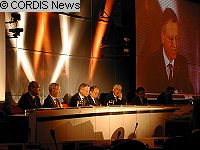Aeronautics advisory council sets out research agenda for next two decades
The Advisory Council for Aeronautics Research in Europe (ACARE) launched an updated version of its strategic research agenda (SRA) on 30 March. The second agenda is more detailed than the first. It looks ahead to aeronautics in 20 years time, and outlines the technology required to meet ambitious targets related to time, cost, the environment, safety and customer-friendliness. 'Today's air traffic was created for another age and is not optimal for today's requirements,' said ACARE's chairman and former CEO of SAAB, Bengt Halse. New technologies are necessary to support the changes that are now needed, and this is where the SRA is required, explained Dr Halse. The focus of the SRA is five 'high level target concepts': - the highly customer oriented air transport system; - the highly time efficient air transport system; - the highly cost efficient air transport system; - the ultra green air transport system; - the ultra secure air transport system. The document highlights the areas where more research will be necessary in order to develop these systems. It provides an indication as to the importance of each separate technology, as well as the timescale of its importance. ACARE emphasises that none of the targets will be prioritised over others, and that technologies developed with one priority in mind may well be transferable to another priority. A number of speakers at ACARE's Aerodays conference in Brussels, Belgium, stressed that for such research to be conducted, increased investment is a necessity. Funding will have to come from national, EU and international programmes, as well as from industry, said Dr Halse. It is no longer possible to shirk this responsibility and to rely on others to fill the funding gap. 'This is a gate that is not open anymore,' he said. EU Science and Research Commissioner Janez Potocnik had reassuring words for ACARE. He promised that he will raise the budget for aeronautics research in his proposals on the Seventh Framework Programme (FP7). Asked by CORDIS News how important public funding really is in the aeronautics sector, considering the very small proportion that it represents, former astronaut and Italian MEP Umberto Guidoni alluded to basic research. While public investment may be on a smaller scale than private sector investment, it is 'important for developing new technologies that are outside the immediate scope of industry,' said Dr Guidoni. 'It can fund basic research that could lead to a breakthrough in the future.' ACARE has addressed all aspects of air travel, including air traffic control and airports, as well as the more obvious aircraft design. 'Our licence to grow as airports depends on technological improvements,' said Stephen Hardwick, director of public affairs at BAA (British Airports Authority). With a decrease in noise and air pollution will come increased public acceptance of airports, and will therefore, in the long term, enable airlines to use more and bigger planes. But as Billy Fredriksson from Linköping University highlighted, if these new technologies are to be developed, people are needed to do the developing. 'We need a sustainable system to deliver people with relevant competences,' said Professor Fredriksson. 'Seeing an aeroplane flying is no longer exciting for young people as it once was. We need to find something new and exciting to attract them.' Outlining the next steps to be taken fell to former ACARE chairman Walter Kroll, President of the Helmholtz Association. The SRA alone is not enough, said Dr Kroll. 'Action is required; action by all stakeholders. Their job is to take the advice and to turn it into work-sharing work programmes. ACARE has paved the way. The stakeholders must now follow that way.'



